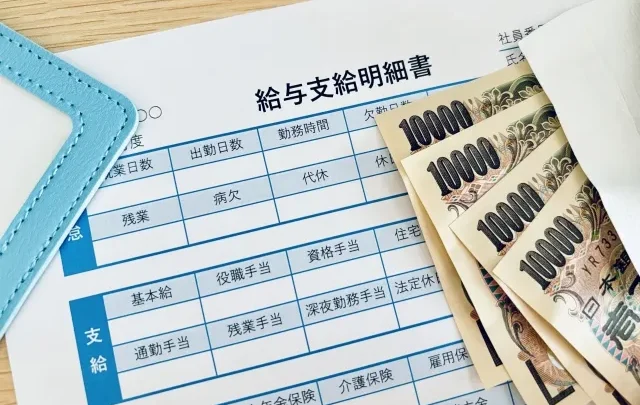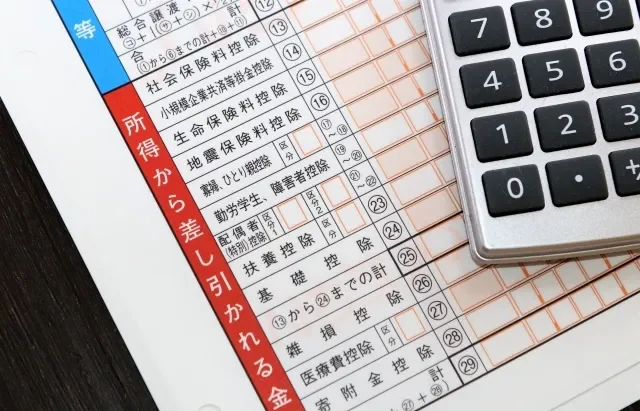【 for foreigners 】 Japanese income tax types, rates, payment methods, and deductions explained.

When working in Japan and earning money, foreigners must also pay Japanese income tax. Income tax is a fair tax imposed on all people living in Japan and is one of the most important systems that you need to understand in order to live in Japan.
This article provides detailed information on Japanese income tax, including the types of taxes, tax rates, conditions for foreigners to be eligible for payment, payment methods, and a list of deductions that foreigners should know.
▼Goandup Picks Click here for recommended articles!
- Required before studying abroad! Goandup Nihongo+, an online Japanese language learning service
- This page introduces services for foreigners who wish to study in Japan or improve their Japanese language skills to learn Japanese online.
- Goandup Salon" community for foreigners living in Japan
- We introduce an online community where foreigners living in Japan can exchange information and interact with each other to support their life in Japan.
- Goandup Study" supports foreigners who want to study in Japan.
- This section introduces study abroad support services that provide comprehensive support to foreigners who wish to study in Japan, from preparation for study abroad to living in Japan.
- Where can I buy a prepaid SIM in Japan? Recommended SIM cards for foreigners are also introduced.
- How to purchase a prepaid SIM and suitable SIM cards for foreigners.
- The Complete Guide to Pocket Wi-Fi in Japan for Foreigners!
- We introduce how to select and recommend pocket Wi-Fi products that can be used conveniently in Japan.
- The Complete Guide to Finding a Job in Japan! Finding a job, changing jobs, and part-time work for foreigners
- This site provides foreigners who want to work in Japan with comprehensive information on how to find a job, recommended job sites, and other information necessary to find a job.
List of Income Tax Types in Japan

Income earned from working in Japan is subject to three main types of taxes: income tax, special income tax for recovery, and inhabitant tax. These are obligations that everyone living in Japan must pay. In addition, it should be noted that sole proprietors are also subject to taxes such as "business tax" and "consumption tax.
Let's take a closer look at each of these taxes.
1. income tax
Income tax is a tax paid to the government on a portion of income earned from working. The income tax rate is based on a "progressive taxation" system in which the higher the income, the higher the tax rate.
The specific income tax rates are as follows
Income tax rate
| Taxable income (income minus various deductions) | tax rate | deduction (from) |
|---|---|---|
| From 1,000 yen to 1,949,000 yen | 5%. | 0 yen |
| From 1,950,000 yen to 3,299,000 yen | 10% (of the total) | 97,500 yen |
| From 3,300,000 yen to 6,949,000 yen | 20%. | 427,500 yen |
| From 6,950,000 yen to 8,999,000 yen | 23% (%) | 636,000 yen |
| From 9,000,000 yen to 17,999,000 yen | 33%. | 1,536,000 yen |
| From 18,000,000 yen to 39,999,000 yen | 40%. | 2,796,000 yen |
| 40,000,000 yen or more | 45%. | 4,796,000 yen |
The income tax calculation method is a bit complicated, but can be obtained by multiplying the amount of income minus various deductions by the above tax rate. For details of the calculation, please refer to the website of the National Tax Agency.
2. special income tax for reconstruction
The Special Reconstruction Income Tax is a tax levied on top of income tax for reconstruction from the Great East Japan Earthquake that occurred in March 2011.
The tax rate for the special income tax for recovery is 2.1% of the amount of income tax paid. In other words, if you pay 100 yen in income tax, you will pay an additional 2 yen in special income tax for reconstruction.
Reference:Withholding of Special Reconstruction Income Tax|National Tax Agency
3. inhabitant tax
Residential tax is a tax paid to the prefectural and municipal governments. The inhabitant tax rate is a flat 10% of income.
Please refer to the following article for a detailed explanation of how to calculate and pay the inhabitant tax.
▶︎ Explains Japanese inhabitant tax rates, calculation methods, and ways to reduce taxes for foreigners!
What are the conditions for foreigners to be eligible for income tax payment?

Foreign residents in Japan are divided into three categories: non-residents, non-permanent residents, and residents who are not non-permanent residents. Please note that each category has a different scope of income tax payment eligibility.
1. non-residents
Non-residents are foreign nationals who do not have a domicile in Japan and have not resided in Japan for at least one year.
Non-residents are subject to withholding tax at the rate of 20.42% in principle on wages, remuneration, and other income earned in Japan. This means that income tax is automatically deducted from the income you earn from working. You do not have to pay income tax on any other income.
2. non-permanent residents
A non-permanent resident is a foreign national who has a domicile or has continuously resided in Japan for at least one year to date, but whose total period of domicile or residence in Japan within the past 10 years has been less than 5 years.
Non-permanent residents are required to pay income tax on income earned in Japan and on income earned outside Japan that is paid or remitted in Japan. However, income earned outside Japan that is not paid or remitted in Japan is not subject to income tax.
3. non-permanent residents
A non-permanent resident is a foreigner who has permission to reside permanently in Japan, or a foreigner who has had a domicile in Japan for a total of more than 5 years within the past 10 years.
Residents who are not non-permanent residents must pay income tax on all income earned worldwide in exactly the same manner as Japanese nationals. Please note that even income earned outside Japan is subject to Japanese income tax without exception.
Reference:Individuals who are liable for tax payment|National Tax Agency
How to Pay Income Taxes

There are two main ways to pay income tax: withholding and final tax return.
1. method of payment in the case of withholding at the source
Withholding at the source is a system whereby the party paying income tax (e.g., company) deducts income tax from the amount paid in advance and pays it to the tax office. Most salaried workers pay income tax through this withholding system.
In the case of withholding tax, there is basically no need to calculate or pay the tax yourself. However, it is necessary to check and adjust the withheld income tax to see if there is any excess or deficiency through year-end adjustments or tax returns.
2. method of payment in case of tax return
In cases where income tax withholding alone is not sufficient, such as sole proprietorships, income tax must be paid by filing an income tax return.
The tax return is a procedure to calculate all income and income tax amounts generated during the year from January 1 to December 31, and to report them to the tax office and pay taxes, in principle, between February 16 and March 15 of the following year.
In principle, income tax must be paid by March 15, the same day as the deadline for filing the tax return. Payment can be made in cash at a financial institution or tax office, by direct debit or credit card, or by e-Tax (electronic tax payment).
Reference:【 Tax return and refund 】
List of major deductions applicable to Japanese income tax

Various deductions are available to reduce the income tax burden. Deductions are a mechanism that allows you to reduce your taxable income by deducting certain amounts from your income.
This section describes the major income tax deductions commonly used by foreign residents. Make good use of the deduction system to save on the taxes you pay.
1. basic deduction
The basic exemption is a basic deduction that is deducted from income when calculating income tax. A flat deduction of 480,000 yen is made regardless of annual income.
Reference:Income Tax Structure|National Tax Agency
2. dependent care exemption
The deduction for dependents is available for those who support a spouse or relative who makes a living in the same household. For each dependent, between 380,000 yen and 630,000 yen is deducted from income. Note, however, that the amount of deduction is different for dependents under 16 years of age.
Reference:Family and Tax|National Tax Agency
Spousal Deduction and Special Deduction for Spouses
The spousal deduction and the special spousal deduction are deductions applicable to a spouse who makes a living together.
The amount of the deduction depends on the amount of the spouse's income, but a maximum of 380,000 yen is deducted from income. The higher the spouse's income, the smaller the deduction.
Reference:Family and Tax|National Tax Agency
4. working student credit
The working student credit is a credit applied to income earned by students through part-time work.
As a general rule, if your total income is less than 750,000 yen and you have only employment income, you can deduct up to 650,000 yen; if you have income other than employment income, you can deduct up to 270,000 yen.
Reference:Working Student Credit|National Tax Agency
5. deduction for social insurance premiums
The deduction for social insurance premiums is a system under which the full amount paid is deductible when social insurance premiums are deducted from salary or when one pays national pension or national health insurance premiums oneself.
Reference:Deduction for social insurance premiums|National Tax Agency
6. foreign tax credit
The foreign tax credit is a system that allows foreign taxpayers who pay income tax on income earned in a foreign country to deduct the amount of tax paid in the foreign country from their Japanese income tax in order to avoid double taxation in both Japan and the foreign country.
Reference:Foreign tax credit for residents|National Tax Agency
Serious employment support to help you realize your dream of working in Japan!

Do you want to work in Japan?
Let us "Goandup" make that dream a reality!
【 Program Features 】
✅ JLPT N3 level Japanese language acquisition
✅ Thorough preparation for the specific skills test
✅ Full support for job hunting in Japan
Business-focused one-on-one lessons will help you find a job in Japan in the shortest possible time.
【 Program Menu 】
- Individual Japanese language lessons
- Intensive curriculum to obtain N3, especially specialized lessons for business Japanese that can be used at work.
- Intensive curriculum to obtain N3, especially specialized lessons for business Japanese that can be used at work.
- Preparation for the Specific Skills Test
- Customized materials for specific skill tests will be used to focus on frequently asked questions and learning to pass the test.
- Customized materials for specific skill tests will be used to focus on frequently asked questions and learning to pass the test.
- Resume and CV support
- To create resumes and CVs tailored to Japanese corporate culture, and to brush up on self-promotion and motivation for application.
- To create resumes and CVs tailored to Japanese corporate culture, and to brush up on self-promotion and motivation for application.
- Interview Preparation
- Guidance on areas for improvement through mock interviews and feedback based on corporate interview scenarios. Learn interview etiquette and behavior unique to Japan.
- Guidance on areas for improvement through mock interviews and feedback based on corporate interview scenarios. Learn interview etiquette and behavior unique to Japan.
- career consulting
- Provide introductions to companies that match the participant's career goals, select companies to apply to, and provide advice on the level of knowledge required by the companies to which the participant is applying.
- Provide introductions to companies that match the participant's career goals, select companies to apply to, and provide advice on the level of knowledge required by the companies to which the participant is applying.
- Chat Support
- In addition to one-on-one individual lessons, we also accept casual questions via DM (visa application, living support, assistance in finding a room, etc.).
If you are serious about your career in Japan, join us now!
▶︎ for more informationclick here.
We will do our best to support your success in Japan!
summary
There are three types of income tax in Japan: income tax, special income tax for recovery, and inhabitants' tax, which is imposed on income earned from work.
Whether or not you are required to pay income tax depends on your status of residence as a foreigner. Note that there are three categories: non-resident, non-permanent resident, and non-permanent resident, each of which has a different range of income subject to taxation.
As a general rule, income tax is paid by withholding for employment income and by final tax return for business income.
Furthermore, there are various deduction programs available to reduce the income tax burden, and it is important to make good use of these programs to save on taxes.
We hope this article will be of some help to you in your life in Japan.
Your support will help us!
Thank you for visiting Goandup Picks. Our mission is to provide you with more useful information to show the world what Japan has to offer.
Your support will help us to further enhance our activities, so please support us!






